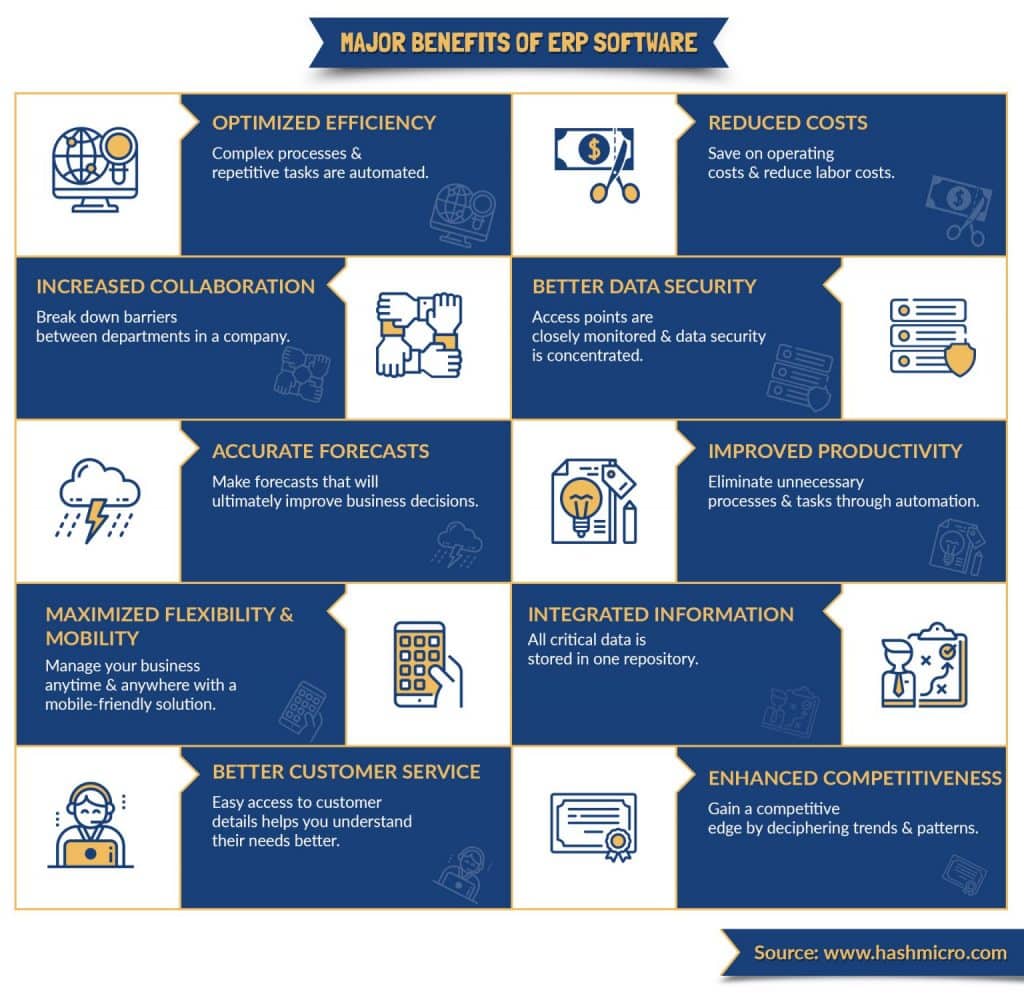Key Takeaways |
15 Main Benefits of ERP System for Businesses
According to Statista, the projected revenue for the Enterprise Resource Planning (ERP) Software market in Singapore is expected to increase steadily in the coming years. By 2023, the market’s revenue is forecasted to grow significantly, with a continuation of this growth trend expected until 2028.
Additionally, the average expenditure per employee on ERP software is anticipated to show a similar upward trend by 2023. On a global scale, the United States is predicted to lead in revenue generation for ERP software in 2023.
This data underscores the increasing importance and adoption of ERP software in Singapore.
Roughly 80% of medium to large businesses in the country have incorporated or partially implemented ERP systems into their operations to run their businesses more smoothly, particularly in industries like manufacturing, logistics, and finance.
So, here are 15 advantages that businesses in Singapore can gain by using ERP solutions:
1. Productivity Boost
There are various ways an ERP system can enhance productivity within companies in Singapore. One of them is by automating repetitive tasks. With this automation, employees can focus on more critical work for the company.
Moreover, this automation allows them to complete tasks more swiftly. The ERP system streamlines workflow processes and reduces the time spent searching for necessary information.
With heightened productivity, there’s no need to increase the number of employees as required before ERP implementation. Because the ERP system handles automation, employees can take on new tasks and other projects that require their skills.
2. Cost Savings
This is the primary reason many Singaporean business owners adopt ERP systems. By cutting business expenses, you can gain more business profits, often in significant amounts!
The automation mentioned earlier is among the ways ERP systems save or even eliminate administrative and operational costs. For instance, manual data entries that consume a considerable amount of paper can be eliminated with an integrated system in place.
That’s not all. The system’s ability to identify higher-than-usual expenditure sources enables you to swiftly make adjustments to reduce those costs and decrease the potential for employee fraud.
Overall, ERP implementation often leads to substantial cost savings as it streamlines operations, reduces manual labor, and minimizes errors, leading to a more cost-effective business model.
ERP systems also come equipped with business intelligence features to create more accurate planning, preventing urgent orders, excessive production, or over-ordering, all of which tend to inflate costs.

3. Workflow Standardization
Similar to standardizing data, another benefit of enterprise resource planning is to standardize workflows. Each department may have different ways of handling specific processes.
It might even happen that two employees within the same department don’t follow the same steps. The ERP system eliminates these differences and ensures that every employee follows the same best practices when working on something.
Often, work is carried out in a certain way simply because it has been a habit for years, not because that method is the best or most efficient. The introduction of ERP in your business will trim unnecessary processes and make work faster and more straightforward.
4. Increased Efficiency
Thanks to the automation of repetitive tasks and the availability of up-to-date information, several processes can be completed faster. This not only benefits the company but also your loyal customers, reducing operational costs and increasing profits.
For instance, consider a factory producing 20 products with an average profit margin of 20%. With an ERP system, business owners can quickly identify the least profitable products.
Upon analyzing the data, it’s found that the labor cost for two items with the lowest margins is higher. After discussing with the staff handling these products, it turns out that the work for these two items is still manual and time-consuming.
Based on this data, the company decides to invest in machines to automate the production process for these two items. As a result, the margin increases to 25%. Through this method, the ERP system has saved billions of rupiahs annually
5. Higher Mobility
In several companies, employee mobility is no longer just a facility but a necessity, especially in industries, like construction.
Fieldworkers and employees frequently moving from one construction site to another would face difficulties using computers or laptops to access the latest company data, such as raw material availability, project progress monitoring, and workforce counts.

Also read: 6 Main Benefits of ERP Software in the Construction Industry
Furthermore, the best ERP software should be mobile-friendly, allowing access anytime, anywhere through employees’ mobile phones. As users access the cloud system via the web, they can view dashboards, reports, and other information from their mobile browsers.
Many ERP system vendors offer mobile applications for convenient usage on smaller screens.
6. Improved Customer Service
ERP enhancing customer service is a key advantage, as it enables more responsive and personalized customer interactions based on consolidated data and insights.
The increasingly competitive landscape urges businesses to vie for the same customers. ERP systems aid in enhancing services by providing comprehensive customer-related information—contact details, order history, and any customer support received—all in one dashboard.
The richness of data provided by ERP enables faster solutions and a more personalized experience when customers seek assistance. Another way ERP systems enhance customer service is by providing accurate inventory and order information.
With this inventory and order data, customers consistently receive the right items at the right time. With better service, customers may become repeat buyers or recommend your business to their associates. Ultimately, using ERP makes companies more competitive in an increasingly competitive market.
Curious about the benefits an ERP system can offer your company? Don’t forget to explore its pricing scheme too! Click the image below to download the HashMicro ERP software price scheme:
7. Real-Time Reporting
Accurate reporting is among the most sought-after benefits of an ERP system. The system can tailor reports for various functions—finance, inventory, procurement, sales and marketing, and HR.
With this, you can not only track the performance of each business component but also identify departments driving business growth and those hindering it.
To obtain accurate reports, you need the most recent or real-time data. If generating income reports from the last quarter takes two weeks, the information you receive might be outdated and no longer relevant.
8. Enhanced Scalability
Have you ever felt that the current software you’re using can’t handle the expanding operations of your company? If so, it means the software lacks good scalability.
The best ERP systems should be capable of growing alongside your company. They should offer optimal functionality while leaving room for additional modules in the future.
Cloud-based ERP systems are the top choice for business owners seeking easy resource additions. This system also reduces the workload on IT teams who would otherwise have to manually add servers if using an on-premise system.
9. Data Security

Undoubtedly, data is the most valuable asset for any company. With data, business owners can make informed decisions for their company’s future. An ERP system can help protect this asset.
With data centralization from an ERP system, rather than data being scattered across various systems with varying security levels, the protection of company data can be heightened. This system replaces spreadsheets and other documents scattered across individual devices or emails.
Security layers are bolstered with cloud-based ERP systems. This way, company information is typically distributed across remote servers to avoid hacking into sensitive customer data.
To understand the benefits of implementing cloud ERP or on-premise ERP, you can read a comprehensive explanation in the following article: Choosing the Best ERP Systems for Your Business Management.
Another benefit of cloud-based ERP systems is the ability to limit who can view and edit data. ERPs usually have easily controlled authorization systems to ensure employees only see the data they need, reducing the chance of fraud.
10. Data Management Standardization
Without centralized data, staff would struggle to find the information they need. This is because data from each division is spread across various applications and spreadsheets. Unfortunately, this method often results in duplicate data with inconsistent formats.
An ERP system helps standardize all crucial company data. Since all data is stored within one system, each piece of data is created in a consistent format, making it easier to generate reports or perform real-time data analysis with ERP.
Such information standardization allows you to gather all necessary data and make decisions based on more accurate information. This way, you can save more time and money.
11. More Accurate Forecasting

How many times have you found your business unprepared for sudden changes? For instance, surges in demand at certain times or conversely, decreased demand resulting in excessive inventory storage?
This can occur due to a lack of accurate forecasting. We’re not talking about mystical forecasting, but rather predictive insights based on historical data of demand, costs, and other figures to anticipate future changes.
With the aid of an ERP system, forecasting becomes significantly more accurate and comprehensive because all the necessary data is in one place. This forecasting makes you better equipped to handle various possibilities.
For example, if the ERP system’s forecast indicates a 30% sales increase, you could purchase more inventory or ramp up production. For service-based businesses, hiring additional staff might be an option to anticipate increased demand.
However, if the forecast predicts that expenses will surpass sales, you can prepare to find the best ways to cut costs.
Ultimately, accurate forecasting can help your business gain more profits and reduce expenses by not overspending in the wrong areas.
12. Increased Visibility
One of the most sought-after benefits of an ERP system by business owners is visibility. Let’s take an example of ERP visibility benefits in the manufacturing industry.
If the purchasing team or procurement division can see the status of purchase orders, they can estimate delivery times to avoid excess or insufficient inventory.
This smoothens production operations. No more production halts due to material shortages, which can be detrimental to the company.
Visibility into task statuses and data managed by other departments can help all teams and employees perform their duties more efficiently.
Is your company involved in manufacturing? Have you faced issues as described? For a more comprehensive understanding of how ERP software can assist manufacturing businesses, explore the following article: Main Benefits of ERP Software for Manufacturing Industry.
13. Enhanced Collaboration

The ERP system facilitates collaboration between departments. Having visibility into how other teams operate and knowing what information they’re seeing makes it easier for your employees to collaborate or even offer assistance to colleagues if possible.
No longer do teams work in isolation, using applications with restricted access solely for their department, and disconnected from systems used by other teams or departments. Everyone uses the same system, with the same standards.
As communication and collaboration among divisions improve, the entire business benefits. With an integrated system’s help, teams can identify duplicate work that can be eliminated or find more efficient ways to accomplish daily tasks.
In addition to this, integrating ERP with existing business software can significantly enhance workflow efficiency and data consistency across platforms.
14. Flexibility
ERP systems are designed to assist various companies, regardless of their shape and size. This is why several leading ERP vendors prioritize flexibility as a key feature in their systems.
This flexibility allows users to adapt the system to the unique needs of each company, such as unique workflows and metrics uncommon in other companies.
It’s crucial because as companies grow, workflows and company KPIs may change unexpectedly. This flexibility ensures the system can still work for your business without needing replacement due to misalignment with evolving business processes.
15. Risk Management
ERP systems can gather data from various business divisions. With this data from ERP, companies can easily and quickly identify various potential risks in financial, supply chain management, operational risks, and more.
Once identified, the ERP system can assist in risk evaluation. This process involves data analysis and potential risk calculations. For instance, if your ERP system is equipped with accounting software, it can help identify credit risks by analyzing customer data and payment histories.
After data is gathered and analysis is conducted, it becomes easier to create risk mitigation plans. For example, in supply chain management, your company can create alternate supply plans in case the primary supplier encounters issues, ensuring production remains uninterrupted.















